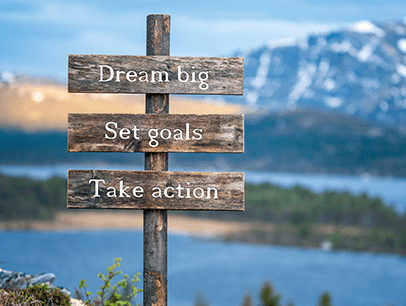Purpose gives you a sense of fulfillment, infuses you with joy, and answers the age-old question of why you were born into this world. A sense of purpose also helps you withstand life’s harshest trials and provides scientifically proven benefits to your mental and physical health.
But while some find purpose as easily as they draw their next breath, others struggle endlessly to find their life’s calling. The good news is psychologists and life coaches say there are proven ways to help identify your own unique purpose and begin setting short- and long-term goals in pursuit of that mission. In doing so, you’ll likely find more satisfaction, achieve greater well-being, become a better leader, and create a life that’s more rewarding for you and all those you encounter along the journey.
Finding Purpose
Purpose is the organizing principle that informs and shapes the decisions in your life, guiding how you set goals, interact with others, and make choices in difficult circumstances. Purpose is an intentionality, such as living to help others, being a caring and involved parent or friend, or creating new businesses that provide jobs or change the world.
But too often we focus only on achieving short-term goals that aren’t connected to any overarching sense of purpose. The result is experiencing a temporary high but feeling an enduring “is this all there is?” emptiness and dissatisfaction in the aftermath of our achievements.
“Most human beings get lost in a sense of action and don’t have a higher sense of purpose,” says Marshall Goldsmith, executive coach and author of What Got You Here Won’t Get You There and Triggers. “Many of the leaders I coach tend to be so focused on achieving goals they forget why they are achieving them in the first place. But purpose or aspiration doesn’t have a finish line. Most of us don’t spend enough time thinking about our larger purpose.”
Experts say purpose should be highly personal and specific and something chosen only by you, not by family, friends, or colleagues who—often with good intentions—try to create your purpose and goals for you.
“The more that your purpose and goal achievement are aligned the more satisfied and happy you’ll be with your life.”
—Marshall Goldsmith“People are always telling us who we should be,” says Nick Craig, founder and president of the Core Leadership Institute, a global leadership development firm in Massachusetts, and author of Leading from Purpose. “At work we receive 360-degree assessments of our performance from peers, and in our personal lives we get constant advice from family and friends. While that feedback can have benefits, if we let it guide us too much, we begin to lose our own uniqueness and particular gifts, which is our purpose.”
Many of us try to “think” our way to finding purpose by writing down lists of jobs, experiences, or activities we think would give us more satisfaction or joy. But Shannon Kaiser, a Portland, Oregon-based international life coach, former Toastmaster, and author of The Self-Love Experiment, says it’s better to “do” your way into finding purpose.
Having the courage to throw yourself into a variety of different life experiences allows you to find out what resonates and begin to narrow down your true purpose, Kaiser says.
“We learn the way on the way,” says Kaiser. “Following your curiosity and having a wide variety of experiences leads you to your bigger picture. Some of those experiences will feel right and others won’t. But it’s only through trying and then reflecting that you’ll find out.”

Perhaps you’re a software developer who feels a yearning to be a teacher, an attorney who’s always wanted to spend more time volunteering to help others, or a longtime corporate leader who’s always wanted to start her own business. The only way to find out if the reality matches your vision is to begin taking small steps in pursuit of that dream.
“I call it inspired action,” Kaiser says. “It’s about learning to trust the unknown and be comfortable in that space. The more we do different things, the more clarity we get about what does and doesn’t inspire us and what gives us a feeling of fulfillment and joy.”
Kaiser also says it’s important to pursue your purpose from a place of excitement and inspiration rather than one of worry or fear.
“If you’re saying, ‘I need to quickly find my life purpose because I just left my corporate career and need money,’ that is a strained place from which to make important decisions. Try to make those kinds of decisions when you’re in a place where you feel inspired or joyful.”
The Value of Becoming Other-Focused
Experts say there can also be pitfalls in making our quest for purpose too much about ourselves. Dr. Tchiki Davis, founder of the Berkeley Well-Being Institute in Berkeley, California, an organization with the mission of making well-being an integral part of life, work, and society, says people often fall into the trap of thinking about purpose only as a self-focused pursuit.
“Often that manifests in language like ‘what are my goals?’ or ‘what do I want to do,’ but studies suggest that many of the things that give us the most purpose are about others. Purpose arises from contributing positively to others’ lives. As one example, we might really enjoy cooking, but we likely feel more purpose when we cook for others,” Davis says. “Finding ways to connect and contribute are good ways to boost a sense of purpose.”
Craig, of Core Leadership Institute, says we all have stories from the “journeys of our lives” that we should examine if we’re struggling to identify a larger purpose going forward.
“There are stories of what we loved in our childhoods, stories of times we were tested and were able to survive or even thrive, stories of volunteer opportunities that were rewarding or of adventures we had that spoke to us,” he says. “In all of those there is a connective thread that has purpose sitting right underneath it. It helps us see what our path has been and also what our journey could look like in the future to make us most fulfilled and happy.”
Yet try as you might, finding a higher purpose in daily life can still be challenging. Experts suggest answering these questions to help pin down your purpose:
- What drives or energizes you?
- What did you love doing as a child before the world told you who you should be or what things you should be doing?
- What were the most challenging times in your life and how did they change or shape you?
- What are you willing to sacrifice for?
- Who do you want to help, and what might that help look like in practice?
- What experiences have you had in any aspect of your life that gave you a lasting sense of satisfaction, joy, or accomplishment?
Sushma Perla, a life coach and emotional alignment specialist based in Dubai, United Arab Emirates, says people often get so caught up in finding purpose that they overlook the daily habits and practices required to live out a higher mission.
“We chase purpose, we want it, we think we need to have it, and sometimes we think we’re lacking it,” Perla says. “Here’s the thing. It’s your beliefs and values that drive every behavior, which, when aligned with your core, creates your life purpose and path. Life purpose isn’t something to be achieved; it’s something to be created.”
Tying Goals to Purpose
Psychologists and life coaches also say it’s important to set specific short- and long-term goals tied to living out your bigger purpose.
“If you don’t set goals to align with your broader purpose, you can end up just living in your head,” says Goldsmith. “The more that your purpose and goal achievement are aligned the more satisfied and happy you’ll be with your life.”
Accredited Speaker Ross Mackay, DTM, a native of Scotland and President of the Towns of York Toastmasters Club in Aurora, Ontario, Canada, gives seminars on a concept he calls the “neuroscience” of goal achievement. Mackay has worked with business leaders in 34 countries and says their secret to success often can be distilled to one common factor: They think deeply about their purpose and goals.
The process of setting and achieving goals happens at both the conscious and subconscious level of the human brain, Mackay says. “Once your short- or long-term goals enter your subconscious it’s extremely difficult to get rid of them,” he says. “It’s like an autopilot in your brain that’s hard to switch off. That comes from constantly thinking about your goals, planning, and working hard to achieve them and tying those goals to a larger purpose.”
“The more we do different things, the more clarity we get about what does and doesn’t inspire us and what gives us a feeling of fulfillment and joy.”
—Shannon KaiserCraig uses a method at the Core Leadership Institute called “purpose-to-impact” that helps leaders live their purpose by tying that mission to a series of goals. The process starts with a statement of leadership purpose and then asks participants to create long-term goals—objectives that are three to five years out—as well as shorter-term goals of two years, one year, six months, three months, and a month into the future.
Davis, from the Berkeley Well-Being Institute, believes it’s also helpful to ask how your goals will benefit others. “For example, the goal of making a million dollars may not evoke that much purpose,” she says. “But making a million dollars so that you can buy your parents a house, donate to your favorite causes, or send your kids to college is likely to evoke more purpose.”
Allowing for Change
Your purpose also can change with time as you age or encounter difficult circumstances like family or friends suffering from illnesses or misfortune that may galvanize you to help search for causes or cures.
What matters most, experts say, is that you continue to seek a higher calling and life’s work. “If you believe your ultimate purpose is to continue to grow, learn, and live your life fully, you’ll find different purposes as you age,” Kaiser says.
“Finding ways to connect and contribute are good ways to boost a sense of purpose.”
—Dr. Tchiki DavisFor example, Mackay says his purpose in Toastmasters over the years is a case in point. “We start out in Toastmasters with the goal of learning to be better speakers, communicators, and leaders but eventually the purpose of many of us becomes helping other new members in our clubs in those same pursuits,” Mackay says. “There is a shift that happens the longer you are a member and the more you become aware that the real purpose of Toastmasters is to help others and to make the world a better place.”
Dave Zielinski is a freelance writer in Minneapolis, Minnesota, and a frequent contributor to the Toastmaster magazine.
Related Articles

Personal Growth
Reframe Your Life in 5 Seconds

Personal Growth
Want Success? Try Happiness

Personal Growth



 Previous
Previous

 Previous Article
Previous Article